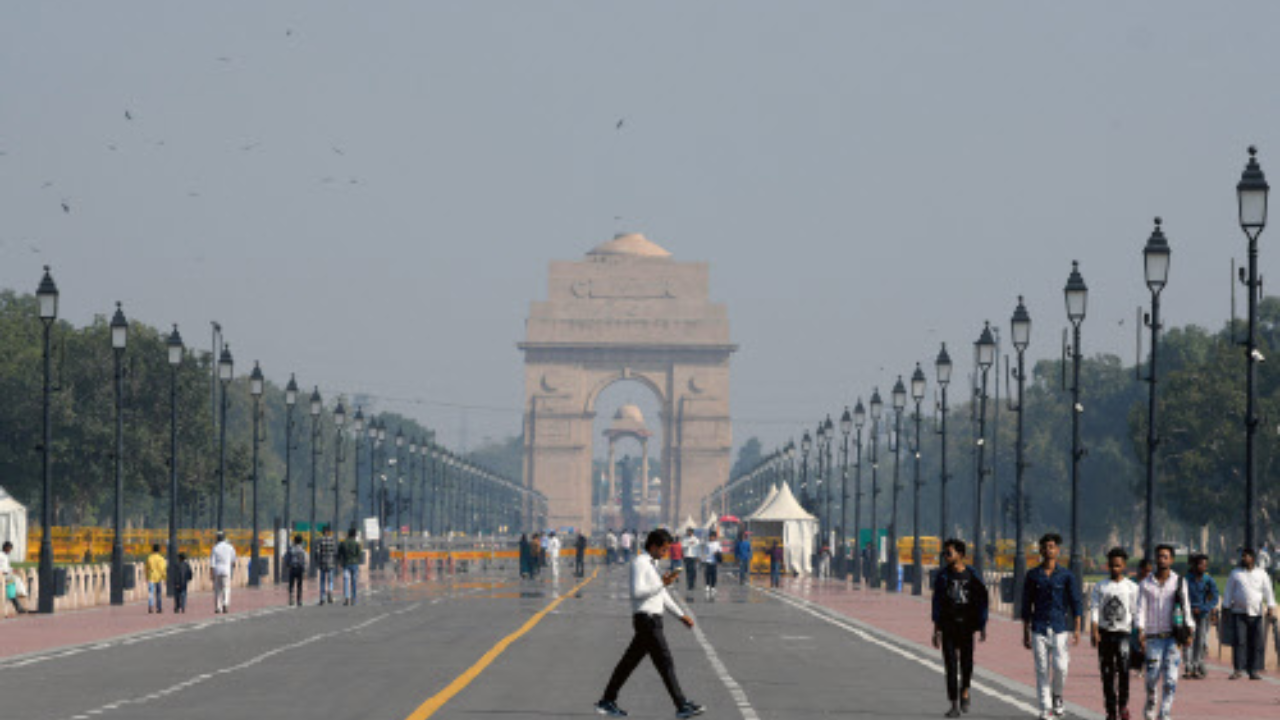[ad_1]
NEW DELHI: On Diwali day, the national capital Delhi recorded its best air quality in eight years, with a 24-hour average Air Quality Index (AQI) of 218 at 4 pm, the best in at least three weeks.
This marks a significant improvement compared to previous Diwali days, with an AQI of 312 last year, 382 in 2021, and 414 in 2020. The improvement is attributed to intermittent rainfall and favorable wind speeds for pollutant dispersion.
Despite the positive trend, concerns remain over potential pollution from firecracker burning and low night temperatures.The India Meteorological Department (IMD) predicted a marginal improvement in air quality ahead of Diwali due to favorable meteorological conditions, including light rain.
The city’s air quality had sharply deteriorated in the two weeks leading up to Diwali, with ‘very poor’ to ‘severe’ conditions. However, the recent improvement is a result of rain and reduced contribution from stubble burning due to a western disturbance.
Delhi has enforced a comprehensive ban on firecrackers, but sporadic incidents were reported. The city anticipates a rise in pollution levels due to firecracker burning and low temperatures.
Last year, a decrease in stubble burning incidents, delayed rain, and favorable conditions prevented severe pollution during Diwali. Data indicates a reduction in stubble burning’s contribution to air pollution, with transport contributing 12 to 14 percent in recent days.
Doctors emphasize the severe health risks associated with Delhi’s polluted air, equivalent to smoking approximately 10 cigarettes a day. Stringent restrictions under the Graded Response Action Plan (GRAP) have been implemented in the city.
The government had postponed the odd-even car rationing scheme due to improved air quality, but it may be considered if pollution levels rise post-Diwali. Doctors warn that prolonged exposure to high pollution levels can lead to respiratory and cardiovascular problems. Delhi’s air quality remains a significant concern during winter months, exacerbated by various local pollution sources.
(With agency inputs)
This marks a significant improvement compared to previous Diwali days, with an AQI of 312 last year, 382 in 2021, and 414 in 2020. The improvement is attributed to intermittent rainfall and favorable wind speeds for pollutant dispersion.
Despite the positive trend, concerns remain over potential pollution from firecracker burning and low night temperatures.The India Meteorological Department (IMD) predicted a marginal improvement in air quality ahead of Diwali due to favorable meteorological conditions, including light rain.
The city’s air quality had sharply deteriorated in the two weeks leading up to Diwali, with ‘very poor’ to ‘severe’ conditions. However, the recent improvement is a result of rain and reduced contribution from stubble burning due to a western disturbance.
Delhi has enforced a comprehensive ban on firecrackers, but sporadic incidents were reported. The city anticipates a rise in pollution levels due to firecracker burning and low temperatures.
Last year, a decrease in stubble burning incidents, delayed rain, and favorable conditions prevented severe pollution during Diwali. Data indicates a reduction in stubble burning’s contribution to air pollution, with transport contributing 12 to 14 percent in recent days.
Doctors emphasize the severe health risks associated with Delhi’s polluted air, equivalent to smoking approximately 10 cigarettes a day. Stringent restrictions under the Graded Response Action Plan (GRAP) have been implemented in the city.
The government had postponed the odd-even car rationing scheme due to improved air quality, but it may be considered if pollution levels rise post-Diwali. Doctors warn that prolonged exposure to high pollution levels can lead to respiratory and cardiovascular problems. Delhi’s air quality remains a significant concern during winter months, exacerbated by various local pollution sources.
(With agency inputs)
[ad_2]
Source link











More Stories
We can’t wait to face India in the final: Pat Cummins | Cricket News
Railways plans 3,000 additional trains in next 4-5 years to minimise number of waitlisted tickets | India News
Faridabad: Man dies after ‘falling from hotel room window’ while partying with friends